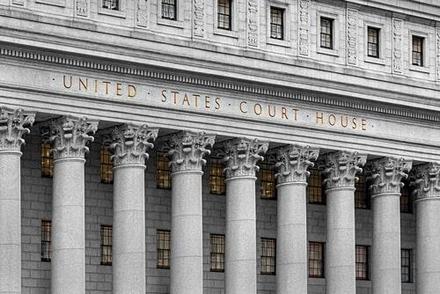TELEPHONES ANSWERED 24 HOURS A DAY
Recent Blog Posts
Can You Post Bail for Federal Charges?
 If you have been charged with a drug crime, a weapons offense, or any other federal crime, you may be wondering if you can post bail so you can remain out of jail until a decision is made at trial. Most people think that as long as they have the money, it is fairly easy to get bail. This is mainly due to the fact that when most people think of jail, they think of state facilities. The federal justice system is much different, and that includes how decisions are made about bail, bond, and pretrial release.
Initial Hearing
Shortly after being charged, you will meet with a Pretrial Services Officer. During an interview, the officer will ask you about your entire background. Afterward, the officer will make a recommendation to the court about whether you need an attorney appointed, and whether you should be detained or released while the case is pending. The judge will review the recommendations of the officer and hear arguments from you and the prosecution pertaining to your pre-trial release.
Bail
Generally speaking, bail is a term used to describe money paid court so you can be released from jail prior to your trial. In state courts, bail is quite common, but it is quite rare in federal court. In federal court, the issue of pretrial release does not revolve around one person’s ability to pay, but rather a number of conditions the court may impose to ensure you return to court.
Bond
The conditions the court imposes to ensure you return to court are known as bond. Bond can incorporate a number of conditions you must meet until the end of your trial. A judge will determine the bond conditions based on five premises. These are that you will:
If you have been charged with a drug crime, a weapons offense, or any other federal crime, you may be wondering if you can post bail so you can remain out of jail until a decision is made at trial. Most people think that as long as they have the money, it is fairly easy to get bail. This is mainly due to the fact that when most people think of jail, they think of state facilities. The federal justice system is much different, and that includes how decisions are made about bail, bond, and pretrial release.
Initial Hearing
Shortly after being charged, you will meet with a Pretrial Services Officer. During an interview, the officer will ask you about your entire background. Afterward, the officer will make a recommendation to the court about whether you need an attorney appointed, and whether you should be detained or released while the case is pending. The judge will review the recommendations of the officer and hear arguments from you and the prosecution pertaining to your pre-trial release.
Bail
Generally speaking, bail is a term used to describe money paid court so you can be released from jail prior to your trial. In state courts, bail is quite common, but it is quite rare in federal court. In federal court, the issue of pretrial release does not revolve around one person’s ability to pay, but rather a number of conditions the court may impose to ensure you return to court.
Bond
The conditions the court imposes to ensure you return to court are known as bond. Bond can incorporate a number of conditions you must meet until the end of your trial. A judge will determine the bond conditions based on five premises. These are that you will:
- Not commit a crime
Is Looting a Federal Offense?
 Protests have erupted all over the country with protesters calling for equality after the death of George Floyd, an unarmed African-American man who was killed while in police custody. Although many of the protests have remained peaceful, looting has also occurred in many cities. Buildings have been burned down, storefronts have been vandalized, and mass theft has occurred. Protesters and looters alike have both been arrested with many asking whether looting is a federal crime. The answer to that question is that it depends on the facts of a specific case. While some of the crimes that result from looting may be charged as a federal offense, many people are also criticizing law enforcement for overcharging behavior that otherwise would not be considered federal jurisdiction.
Offenses Associated with Looting
Looting in and of itself is not a criminal term, but a person may be charged with a specific act that results from looting. The most common offenses associated with looting include:
Protests have erupted all over the country with protesters calling for equality after the death of George Floyd, an unarmed African-American man who was killed while in police custody. Although many of the protests have remained peaceful, looting has also occurred in many cities. Buildings have been burned down, storefronts have been vandalized, and mass theft has occurred. Protesters and looters alike have both been arrested with many asking whether looting is a federal crime. The answer to that question is that it depends on the facts of a specific case. While some of the crimes that result from looting may be charged as a federal offense, many people are also criticizing law enforcement for overcharging behavior that otherwise would not be considered federal jurisdiction.
Offenses Associated with Looting
Looting in and of itself is not a criminal term, but a person may be charged with a specific act that results from looting. The most common offenses associated with looting include:
- Possession of destructive devices
When an Internet Search Turns Into a Crime
 Billions of people use search engines such as Google every day to look up information, videos, local businesses, and more. Most searches conducted are fairly innocent and will not attract the interest of federal authorities, such as the FBI. Unfortunately, there are some search terms that could catch their attention, and that may even leave you facing federal criminal charges. It is important to know what these search terms are, as even just searching for mere interest's sake may not provide a valid defense.
Child Pornography
Generally speaking, viewing pornography online is not a criminal act. However, when pornographic material depicts children under the age of 18, it is considered child pornography, a federal offense that state and federal law enforcement officials take very seriously. Searching for child pornography, even if you do not view it, may also be considered a crime as those searches will remain in your history and could technically mean that you were in possession of the material.
In some cases, a person may view pornographic material depicting children by accident. Still, proving your actions were accidental is extremely challenging.
Other Illegal Searches
Although child pornography may be the most commonly thought of search that is illegal, there are other terms that are considered illegal as well. Any term related to terrorist acts, such as how to build a bomb, are also flagged by federal authorities and are heavily investigated. Agencies such as the FBI will likely look at the rest of your search history to try and determine if you were engaging in illegal activity.
Copyright material is also found extensively online. In fact, most of the content online is protected by federal law. Streaming this material or downloading it to your computer is also considered a criminal offense, as it violates federal law.
Penalties for Illegal Searches
The penalties for conducting an illegal search, if convicted, will vary depending on the actual offense committed. Child pornography and searches related to terrorism acts carry the heaviest sentences, with jail time and high fines likely possibilities. Many people think that violating copyright law may not be a major offense, but that crime too, can result in heavy penalties. Fines associated with violating copyright law are quite steep, and it is possible to face jail time, as well.
Any time someone is accused of conducting an illegal search, their computer will likely be seized so law enforcement can delve deeper into their history. Individuals will also be questioned extensively, and perhaps even pressured or coerced into admitting that they committed an act when they did no such thing.
Our Chicago Federal Criminal Defense Lawyer is Here to Help
Billions of people use search engines such as Google every day to look up information, videos, local businesses, and more. Most searches conducted are fairly innocent and will not attract the interest of federal authorities, such as the FBI. Unfortunately, there are some search terms that could catch their attention, and that may even leave you facing federal criminal charges. It is important to know what these search terms are, as even just searching for mere interest's sake may not provide a valid defense.
Child Pornography
Generally speaking, viewing pornography online is not a criminal act. However, when pornographic material depicts children under the age of 18, it is considered child pornography, a federal offense that state and federal law enforcement officials take very seriously. Searching for child pornography, even if you do not view it, may also be considered a crime as those searches will remain in your history and could technically mean that you were in possession of the material.
In some cases, a person may view pornographic material depicting children by accident. Still, proving your actions were accidental is extremely challenging.
Other Illegal Searches
Although child pornography may be the most commonly thought of search that is illegal, there are other terms that are considered illegal as well. Any term related to terrorist acts, such as how to build a bomb, are also flagged by federal authorities and are heavily investigated. Agencies such as the FBI will likely look at the rest of your search history to try and determine if you were engaging in illegal activity.
Copyright material is also found extensively online. In fact, most of the content online is protected by federal law. Streaming this material or downloading it to your computer is also considered a criminal offense, as it violates federal law.
Penalties for Illegal Searches
The penalties for conducting an illegal search, if convicted, will vary depending on the actual offense committed. Child pornography and searches related to terrorism acts carry the heaviest sentences, with jail time and high fines likely possibilities. Many people think that violating copyright law may not be a major offense, but that crime too, can result in heavy penalties. Fines associated with violating copyright law are quite steep, and it is possible to face jail time, as well.
Any time someone is accused of conducting an illegal search, their computer will likely be seized so law enforcement can delve deeper into their history. Individuals will also be questioned extensively, and perhaps even pressured or coerced into admitting that they committed an act when they did no such thing.
Our Chicago Federal Criminal Defense Lawyer is Here to Help
Few people consider that conducting a search online could result in criminal charges. Unfortunately, it happens all too frequently. If you have been accused of conducting an illegal online search and are facing charges, call our skilled Chicago federal criminal defense lawyer at the Law Offices of Hal M. Garfinkel today. Attorney Garfinkel knows that not everyone charged with a federal crime is guilty, and he has the necessary experience to help defendants beat the most serious federal charges. Call us at 312-629-0669 or contact us online to schedule a free consultation and to learn more about how he can help.
Stalking Can Quickly Become a Federal Offense
 Many people are familiar with the term ‘stalking,’ but because this offense is commonly charged at the state level, individuals are often surprised to learn that they are facing federal charges. Under certain conditions, a stalking charge can quickly turn into a federal offense and when they do, it is important to speak to a lawyer experienced with the federal criminal justice system.
The Definition of Stalking Under Federal Law
The federal statute that governs stalking defines the offense as:
Many people are familiar with the term ‘stalking,’ but because this offense is commonly charged at the state level, individuals are often surprised to learn that they are facing federal charges. Under certain conditions, a stalking charge can quickly turn into a federal offense and when they do, it is important to speak to a lawyer experienced with the federal criminal justice system.
The Definition of Stalking Under Federal Law
The federal statute that governs stalking defines the offense as:
- Placing another person in reasonable fear of serious bodily injury or death to themselves, their family members, spouse, or intimate partners, or
- Causing, or attempting to cause, significant emotional distress to the victim, or
- Acting with the intent to injure, harass, kill, or intimidate the victim
- Placing a victim under surveillance in an effort to injure, harass, kill, or intimidate them
Are You Under Investigation for Prescription Drug Fraud?
 Pharmacists help people every day, providing the necessary medication that helps patients with their illnesses and injuries. Few pharmacists expect to receive a target letter or a federal subpoena and when they do, it is easy to imagine the worst-case scenarios. While pharmacists are often the target of prescription drug fraud investigations, it is important not to panic. There are defenses available for these cases and ways you can protect yourself.
Pharmacists help people every day, providing the necessary medication that helps patients with their illnesses and injuries. Few pharmacists expect to receive a target letter or a federal subpoena and when they do, it is easy to imagine the worst-case scenarios. While pharmacists are often the target of prescription drug fraud investigations, it is important not to panic. There are defenses available for these cases and ways you can protect yourself.
Becoming Involved in the Government’s Investigation
Once you learn that you are under federal investigation, it is easy to want to wait it out, hope for the best, and see what happens. This is a big mistake. The Department of Justice (DOJ) and the Drug Enforcement Administration (DEA) are overzealous in their investigations and they cannot go unchecked. A lawyer can ensure that the investigation is being conducted in accordance with the law and that you do not provide more to the investigators than you are legally obligated to.
What Are the Most Common Federal Offenses?
 Federal offenses are often misunderstood, mainly because people are more familiar with state crimes that are prosecuted at the state level. Federal crimes are those that violate federal law and, although state law often mirrors this law, there are times when the crime has certain elements that make it a federal offense. A drug crime, for example, violates state law but if the crime involves a border crossing, it becomes a federal crime. Drug offenses are one of the most common federal crimes, as are weapons crimes and white-collar crimes.
Federal offenses are often misunderstood, mainly because people are more familiar with state crimes that are prosecuted at the state level. Federal crimes are those that violate federal law and, although state law often mirrors this law, there are times when the crime has certain elements that make it a federal offense. A drug crime, for example, violates state law but if the crime involves a border crossing, it becomes a federal crime. Drug offenses are one of the most common federal crimes, as are weapons crimes and white-collar crimes.
Drug Crimes
Any offense that violates the federal Controlled Substances Act is considered a federal crime. Drug crimes are some of the most common offenses at the state level too, but there are some significant differences between the two. For example, while many states have legalized marijuana use, even in these states it is illegal to consume the drug on federal property. If someone was found consuming marijuana on federal property, they could face federal charges, although it would be unlikely.
How Tax Fraud Affects Accountants
 When most people think of tax fraud, they typically think of a person that tries to avoid paying the proper taxes they owe and then get charged with tax evasion. While that is certainly one type of criminal offense involving taxes, there are others as well. These offenses fall under the umbrella term of tax fraud and many people can be charged with these crimes, including accountants, without even realizing that they engaged in criminal activity.
When most people think of tax fraud, they typically think of a person that tries to avoid paying the proper taxes they owe and then get charged with tax evasion. While that is certainly one type of criminal offense involving taxes, there are others as well. These offenses fall under the umbrella term of tax fraud and many people can be charged with these crimes, including accountants, without even realizing that they engaged in criminal activity.
What Is Tax Fraud?
Tax fraud, in its simplest terms, occurs when a person makes intentional misrepresentations, or false statements, on a tax return, or a person falsifies tax documents. Tax evasion, on the other hand, refers to using illegal means to avoid paying taxes. Tax fraud is governed under 26 U.S.C. 7206 (1) and under this statute, a person may face charges of tax fraud if they:
- Created and submitted a return, statement, or other legal documents which contains false statements about an important matter,
What Is the Federal Crime of Perjury?
 In its most basic form, perjury is defined as lying under oath and it is a federal offense. There are two federal statutes that define perjury. The first outlines general perjury, while the other defines making false declarations before a court or grand jury. Although these statutes differ slightly, with one requiring a federal court proceeding, the definition of the act of perjury largely remains the same. That definition may seem simple, but there are five elements that must be met in order for the prosecution to secure a conviction.
In its most basic form, perjury is defined as lying under oath and it is a federal offense. There are two federal statutes that define perjury. The first outlines general perjury, while the other defines making false declarations before a court or grand jury. Although these statutes differ slightly, with one requiring a federal court proceeding, the definition of the act of perjury largely remains the same. That definition may seem simple, but there are five elements that must be met in order for the prosecution to secure a conviction.
Perjury Must Happen Under Oath
A person can make false statements when they are not under oath and it is not considered perjury. For an offense to have been committed, a witness must have promised to provide honest statements to a person that has the authority to administer the oath, such as a court official. The proceeding in which someone takes an oath must also be considered “competent,” or comply with the law.
Credit Card Fraud: There is More Than One Kind
 It was in late March that a major credit card fraud ring was shut down, an effort that was coordinated between Russia’s Federal Security Service (FSB) and United States law enforcement. One man is believed to be the mastermind behind over 40 websites on the dark web that were used to collect and sell stolen credit cards. The man and his associates used cryptocurrency to move hundreds of millions of dollars gained from the credit card theft, and it was this gain that the American authorities seized.
It was in late March that a major credit card fraud ring was shut down, an effort that was coordinated between Russia’s Federal Security Service (FSB) and United States law enforcement. One man is believed to be the mastermind behind over 40 websites on the dark web that were used to collect and sell stolen credit cards. The man and his associates used cryptocurrency to move hundreds of millions of dollars gained from the credit card theft, and it was this gain that the American authorities seized.
Although stealing credit cards is one type of credit card fraud, there are others that happen very frequently, as well. Three of the most common types of fraud that are considered federal offenses are below.
Phishing Scams
Phishing scams have become very commonplace today. These scams involve emails that look as though they have come from banks and other financial institutions, and credit card issuers. Typically the email will state that there is a problem with the credit card account and will ask the cardholder to click on a link within the email and enter their login information, specifically their password. The websites that the email link directs them to look the same as the official ones, but they are illegitimate. They simply allow someone else to access the information so the offender can wrack up fraudulent credit card fraud charges.
Can You Plea Bargain in a Federal Criminal Case?
 In many scenarios when someone has been charged with a crime, they have the hope of a plea bargain, particularly if the prosecution has built a strong case against them. Many people understand the concept of plea bargains, largely due to the fact that television shows and movies often include them within the plot of the story. When faced with a criminal trial, though, people are prone to wonder if the prosecution will offer a plea bargain and, if so, whether or not they should accept one.
In many scenarios when someone has been charged with a crime, they have the hope of a plea bargain, particularly if the prosecution has built a strong case against them. Many people understand the concept of plea bargains, largely due to the fact that television shows and movies often include them within the plot of the story. When faced with a criminal trial, though, people are prone to wonder if the prosecution will offer a plea bargain and, if so, whether or not they should accept one.
Although plea bargains are quite common in state courts, they are typically rarely offered in federal court, for many reasons. If offered one, it is in the accused’s best interests to work with a federal criminal defense lawyer that can determine if the plea bargain is in their best interests.
Advantages of Plea Bargains
Plea bargains are an agreement between the prosecution and the individual accused of a crime. Plea bargains involve the defendant pleading guilty to a lesser crime in exchange for a lighter sentence. It is easy to assume that plea bargains only hold advantages for the defendant because their sentence is not as harsh. However, they also hold benefits for the court. By offering a plea bargain, the court will not have to hold a trial, which takes time and uses the court’s valuable resources. When a plea bargain deal is accepted, the accused does not have to stand trial.




